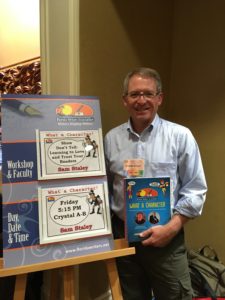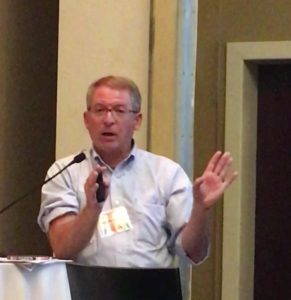 I have once again been invited back to join the faculty of the Florida Writers Conference !
I have once again been invited back to join the faculty of the Florida Writers Conference !
This year’s conference (the 17th annual conference) will be at the Hilton Orlando/Altamonte Springs, October 18-21, 2018. The theme is “Where does our muse live?” Other speakers will include former prosecutor and crime novelist Linda Fairstein as the National Guest of Honor; Florida Writer of the Year Heather Graham, (author of 200 novels and novellas!); and Peter Meinke will be heralded as Florida’s Poet Laureate.

I will be leading two workshops and participating on a panel. I will be moderating a panel called “Bring It On Home to Me: Nailing the Ending” (Friday, October 19th at 4:40 pm). As the author of two book series, I should know a little about this, but my role is to let the panelists shine!
My first workshop will update last year’s program, “Show Don’t Tell: Learning to Love and Trust Your Readers” (Friday, October 19th at 9:00 am). Among other techniques, I will use movie clips to explore ways description conveys mood, tone, setting, and story. From the description:
One of the most common writing mantras is “show don’t tell”—never say in words what can be described through action or dialogue. But there is a time and place for showing and telling, and this workshop will use interactive exercises to help authors recognize the points in their manuscript where showing is most effective, develop tools and techniques for expanding their descriptive capabilities, and engaging their readers more fully. Examples from published literature will be used to illustrate the problems created by “telling,” and how showing can enrich the story. The workshop will also use clips from contemporary films such as Baby Driver and Adrift to develop techniques for expanding an author’s skill set in using description to advance story and plot.
At the end of this workshop, participants will have learned how to:
- Recognize typical writing traps that lead to “telling” rather than showing.
- Identify areas within their manuscript that might appropriately lend themselves to showing rather than telling.
- Develop and apply new tools for incorporating showing rather than telling to give readers more leeway in interpreting character movements, actions, and motivations.
The second workshop is a completely new creative concoction!

As most of my readers know, I use foreign language extensively in my novels. I use them to differentiate characters, add layers to scenes, set the tone of conversation, and drive action. The Pirate of Panther Bay series, in particular, uses French and Spanish for these purposes (and I add the “dead” language of the Calusa Indians). Renegade uses Spanish to both bring readers into the world of an urban American barrio and keep them out.
Unfortunately, many writers are afraid to use foreign language, but I’ve developed tools and techniques that almost anyone can use, whether they fully understand the language or not. The title? “Mais Oui! Deepening Story and Character with Foreign Language” (Sunday, October 21st at 9:15 a.m.)
From the description:
This interactive workshop will show how even minor uses of foreign language can deepen a character, create unexpected plot twists, and create richer stories, even for authors with little practical knowledge of a non-English language. The workshop will demonstrate how simple, but tactical, placements of foreign words such asoui,non,si,konnichiwacan give efficiently and effectively differentiate characters, how longer uses of simple phrases can add an exotic flare to scenes, and dialogue in foreign languages can convey important shifts in tone and meaning.
The workshop will also alert writers to the pitfalls of using web-based translation programs, the consequences of using too much foreign dialogue, and introduce them to “best practices” in using foreign language.
The workshop’s concluding exercise will draw on the vocabulary of the “dead” language of South Florida’s 18th century Calusa Indians to develop and practice skills in using foreign language in English narrative manuscripts.
At the end of this workshop, participants will have learned how to:
- Recognize opportunities to use simple foreign language words to deepen character development without alienating English language readers.
- Use simple foreign language phrases to add dimension and complexity to plot. Apply best practices to using foreign language effectively for an English language readership.
- I will also be available to talk to writers at designated times about writing fiction (six published novels) and nonfiction (7 published books), as well as how to work with mainstream media (e.g., newspapers, radio, etc.)
Click here to see the full conference program.
Click here to register for the conference.
See you in Orlando!